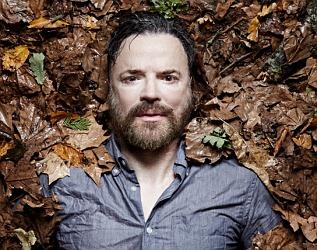Uncle Vanya 2016
Life is famously an endurance test for many of the characters in Chekhov's Uncle Vanya. And Robert Icke's languid yet riveting new production of the play may prove to be one for some members of the audience, too: there were quite a few walk-outs at the Saturday evening performance I attended. Admittedly, some may have been rushing for their trains: it ended just shy of 11pm, after an uncommonly long running time of 3 hours twenty minutes, including an extremely unusual provision of three ten-minute intervals.
But if Icke, who has also provided a new adaptation, has the confidence as well as arrogance of youth (he's just 29) to do things his way, he also has the originality, too, and the result — not unlike his version of Oresteia last year — is a crushingly brilliant new take on an all-too-familiar play. I don't think I've ever seen the third act confrontation between Uncle Vanya (here re-named Uncle Johnny) and the professor husband of his late sister played out so powerfully or urgently, as Johnny suddenly realises how used and abused he has been, looking after the estate without a single pay rise ever, and is now being threatened with eviction from it.
The stakes are dramatically high, as they always are in Chekhov, but here it suddenly feels shockingly relevant and resonant, too, as this contemporary adaptation frees the play from the distance of the past and brings it shockingly into the present. The result is bold, terrifying and shattering.
The truly great Paul Rhys is extraordinary as Uncle Vanya/Johnny, with an utterly palpable despair at how wrong his life has gone and how he has wasted it. The play is the ultimate dramatic expression of how depression works and more importantly feels; the endless, grinding sensation that only death will set you free from it. Yet Chekhov and now Icke also find the leavening humour and resilience in it, too; the need to go on and not give up, beautifully expressed by Johnny's niece Sonya: "We have to just keep living. We'll keep going. Uncle Johnny? You and me will keep going — through the long procession of days and the endless evenings, through how much it hurts, through the pain that we endure, and we will work every day to make someone else rich and finally we'll collapse into old age, and, when the time comes, drop into our graves with the sad knowledge we would always end up there."
Although we watch this play always knowing where it will end up, too, the grace notes of Icke's stunning production constantly offer up new perspectives. That's literally the case here, with the stage becoming a wooden rotating cube that is kept in slow motion for much of the action. But emotion is kept on a slow simmer, too, until it erupts so violently in that third act. There are also performances of tremendous feeling from Jessica Brown Findlay as Sonya, Tobias Menzies as the doctor she is besotted with but who in turn has fallen hard for the professor's wife, played by Vanessa Kirby, and Richard Lumsden as a guitar-playing Cartwright. The ensemble cast also features Hilton McRae as the unyielding professor, Ann Queensberry as the ever-reliable nanny, and Susan Wooldridge as an imperious, mostly silent Maria, mother to Johnny.
It is a must-see — but also not for everybody.
(Mark Shenton)
"Robert Icke seems on a personal mission to renovate the classics. It worked with Oresteia. In the case of his modernised version of Chekhov's masterpiece, the approach yields a wealth of illuminating detail and fine performances."
Michael Billington for The Guardian
"The performances are strong, with Downton Abbey's Brown Findlay (who also appeared in Oresteia) skilfully showing the tomboyish Sonia as someone who, despite being ground down by hardship, exists in a suspended state of adolescence."
Ben Lawrence for The Telegraph
"Unlike Icke's previous work, Uncle Vanya doesn't startle. What it does do is clarify the play: it's clear and fresh as a draught of water, revealing life and human frailty with pellucid perspicacity."
Holly Williams for The Independent
"Uncle Vanya is usually worth it for the closing scene, when silence reclaims the house. This production is no exception."
Quentin Letts for The Daily Mail
"At nearly three and a half hours, with three intervals, this is a deliberately unhurried production. The mood is defined by Hildegard Bechtler's rotating set, which looks like a giant four-poster bed — apt for a drama full of languid longing and cyclical unhappiness, though it creates some tricky sight lines."
Henry Hitchings for The Evening Standard
External links to full reviews from popular press
Guardian - Telegraph - Independent
Historic Uncle Vanya Reviews
Originally published on
